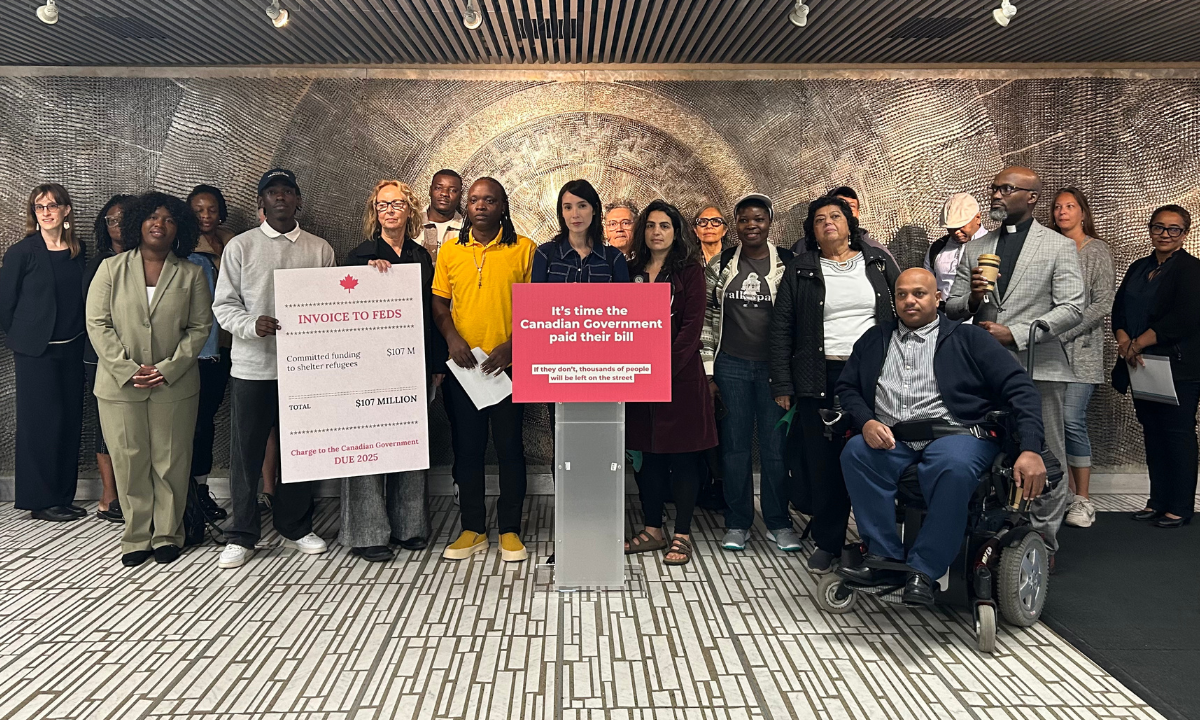Federal funding cuts to refugee housing will negatively impact Black, African communities most, say advocates
Why It Matters
In 2023, several refugees who arrived in Toronto ended up unhoused or in the city’s temporary shelters. Many had arrived from African countries. Organizations have warned that the federal government’s cuts to the Interim Housing Assistance Program (IHAP) could lead to another emergency in the city, with local municipalities, churches and community groups picking up what they say should be a federal responsibility.

Organizations serving refugees warned that potential roll-backs in federal funding will disproportionately impact Black and African people seeking safety in Canada.
“We need to face the truth: not all groups arriving in Canada are treated equally,” said Shula Katz, a frontline community worker and advocate.
“Canada has already demonstrated that when it chooses to, it can provide strong support such as income assistance, temporary housing and settlement services.”
Black and African refugees are among those most likely to experience systemic racism at the hands of landlords when they first arrive, having to then turn to the shelter system, Katz said.
In 2023, the Greater Toronto Area saw a large number of refugees arriving from African countries. With the shelter system at capacity, many refugees and asylum seekers were spending their first nights in the city sleeping on the streets.
Some slept outside the city’s Central Intake building, said Christopher Nkanbwe, CEO of the African Centre for Refugees in Ontario-Canada.
In that time, many Black-led organizations and churches stepped up to fill the gap, said Francesca Allodi-Ross, executive director of Romero House, a Toronto charity providing housing, immigration and settlement support to refugee claimants.
Some of those organizations even found themselves evicted from the premises they operated from, Allodi-Ross said.
On Sep. 29, Progress Toronto and several frontline community organizations called on the federal government to compensate the City of Toronto for the $107 million required through the Interim Housing Assistance Program (IHAP) to support transitional housing costs for refugee claimants and asylum seekers.
Speakers noted that federal funding cuts will lead to community groups, charities and municipal governments taking on more responsibility without adequate funding to sustain the work.
“The costs of care for people don’t go away,” said Diana Chan McNally, a community worker in downtown Toronto and a member of the city’s Housing Rights Advisory Committee.
“They simply are shifted somewhere else: to emergency departments, streetcars, sidewalks, parks, libraries, campuses, malls and coffee shops.”
Government cutbacks flow down to non-profits
The City of Toronto is set to receive 74 per cent less than the amount needed to cover the cost of housing and supporting refugee claimants, McNally said.
In addition, the allocation to the Canada-Ontario Housing Benefit (COHB) is also being reduced at a time when subsidized housing lists are over a decade long, and social assistance is not stretching far enough to meet the cost of living in the city.
The City of Toronto will receive $7.95 million through COHB in 2026, down from $19.75 million in 2025 and $38 million in 2024.
IHAP has been “critical in supporting refugee claimants seeking safety and shelter in Toronto,” said Leslie Gash, executive director of the Toronto Shelter Network.
Cuts to IHAP threaten the sustainability of an already-full shelter system, Gash said.
McNally emphasized that the protection and safety of refugees seeking asylum in Canada is “enshrined the law” as a federal responsibility. Cuts put lives at risk, she said.
At Romero House, additional funding has allowed the organization to expand its capacity, which is now at risk of closing with impending cuts, Allodi-Ross said.
Meanwhile, the charity also calls upon its network of community hosts who open up bedrooms to refugee claimants in times of emergency.
Given the lack of sustainable funding from government sources, some organizations are developing transitional housing through private funding sources. For instance, the African Canadian Collective has established a refugee housing facility with wraparound services and support.
Kizito Musabimana, founder of the Rwandan-Canadian Healing Centre and acting chair of the African Canadian Collective, said the transitional housing models are working well. However, cuts to IHAP funding threaten their longevity.
Along with the cuts to the City of Toronto, Allodi-Ross signalled towards yet another impending challenge: “we don’t know if there is going to be any funding after March 2027.”

